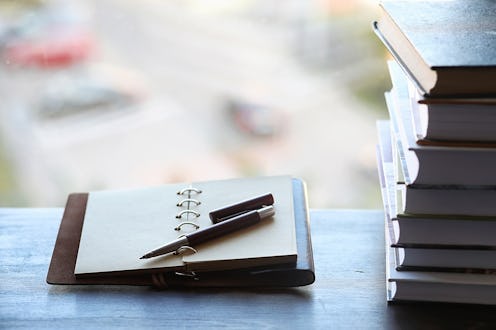Books
I'm In A Total Reading Slump Right Now — But Here's My Plan For Getting Out Of It
I consider myself a very public reader. A Reader with a capital R if you will. But it wasn't always this way. It used to be that I read whatever I wanted, whenever I wanted. I didn't give much thought to how many books I read in a year, or whether I was keeping up with the biggest books or all the bookish trends. I was an avid reader, yes, but my reading life was actually very private; it was a casual hobby that didn't very much affect any other part of my life besides for what the books meant to me. But the shift to my recent experience with reading fatigue actually started back in 2015, for a couple of reasons.
First, I got a new job as a bookseller, where I was suddenly surrounded by other people who loved books as much as I do. Not only did I want to catch up on some of the staff-wide favorites and keep up with the bookish conversation, reading new releases was suddenly of the utmost importance when it came to handselling to customers. Second, I started following Booktube (the YouTube book community) and Bookstagram (bookish Instagram) accounts in earnest, keeping up with all of the most buzz-worthy books, monthly wrap-ups, and hauls.
Of course, all of these things started to encroach on my reading life in small ways. And while a vast majority of these things were positive — being part of a wider bookish community, returning to my journalism roots as Books writer for Bustle, reading some really great books — it turned out that there were some negatives, too. And they all culminated this year into the biggest bout of reading fatigue I've ever experienced.
So what is reading fatigue? It can mean different things to different readers (and they have been tons of discussion about just that in the book community) but it mostly leads to the realization that reading is not just a relaxing, enjoyable hobby anymore. Somewhere along the way it's become some combination of competitive, performative and public so that reading has become less about the act of enjoying the books and more about how we stack up with other readers.
Somewhere along the way it's become some combination of competitive, performative and public so that reading has become less about the act of enjoying the books and more about how we stack up with other readers."
For me it started with a few different things. I made my yearly reading goal on Goodreads bigger and bigger each year, hoping to keep up with everyone else by reading more than ever before. I stopped aimlessly browsing the bookstore looking for that unexpected new favorite, focusing instead on the huge stack of ARCs, library copies, and other books I already had at home, worried about staying up on the relevant talk in the bookish community. I started to envy people who had enough room for multiple bookshelves stuffed with hardbacks, and even more so the people who could somehow devour over 100 books in a single year.
Midway through 2017, I was completely wiped out. Even though I was caught up on my moderate reading goal of one book a week, I found that I was reading a lot in an effort to beat even that — a lot of new releases, a lot of big buzz books — but I wasn't, for the most part, enjoying the process. Sure, I had found a healthy handful of real favorites in the bunch, from Rachel Khong's Goodbye Vitamin to Erin Chack's This Is Really Happening, but I was rushing through each read looking for the next one, not picking things up based on mood necessarily but based on whether I thought I should be reading it.
Whether the books were objectively good or not didn't seem to matter...I was starting to base my reading experience on whether I could finish a book quickly and whether I could check off a box on an arbitrary list of must-reads, and not about the story itself. Based on how widespread the conversation about bookish fatigue has been this year, chances are you might be feeling the same way. So, what can be done about it? How can we make 2018 a year full of reading that is both personally and socially rewarding? I have a few ideas.
Whether the books were objectively good or not didn't seem to matter...I was starting to base my reading experience on whether I could finish a book quickly and whether I could check off a box on an arbitrary list of must-reads, and not about the story itself."
Some of these things I've already started to utilize in the second half of this year, from social media breaks to meditating, and they've already made a huge difference in retraining my brain when it comes to reading. And that, I've found, is really the key to keeping reading fatigue at bay: ignoring the way our brains have been trained to read in this new social world, and just, well, do what we want.
In 2018 I am going to focus less on the stats, less on the "should be reading" or finishing books I'm not enjoying just because it will add to my numbers. I'm going to work hard on not comparing myself to other readers and just...read. Read books that appeal to me and take my time with them, fully immersing myself without worrying about who is reading what and how much. Because no one can read everything, but everything we read can be meaningful and enjoyable, when we remember why we do it in the first place.
